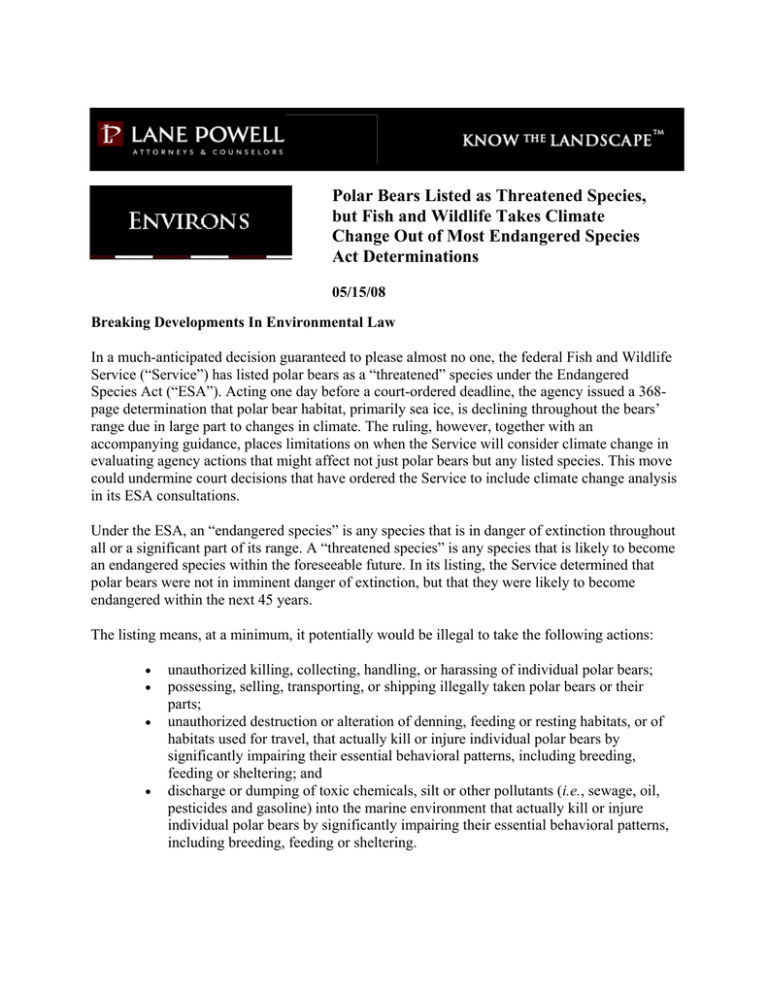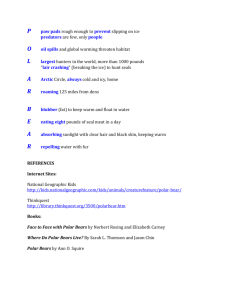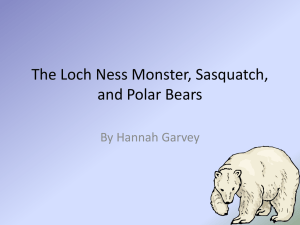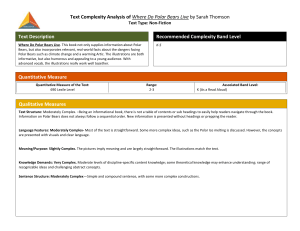Polar Bears Listed as Threatened Species,
advertisement

Polar Bears Listed as Threatened Species, but Fish and Wildlife Takes Climate Change Out of Most Endangered Species Act Determinations 05/15/08 Breaking Developments In Environmental Law In a much-anticipated decision guaranteed to please almost no one, the federal Fish and Wildlife Service (“Service”) has listed polar bears as a “threatened” species under the Endangered Species Act (“ESA”). Acting one day before a court-ordered deadline, the agency issued a 368page determination that polar bear habitat, primarily sea ice, is declining throughout the bears’ range due in large part to changes in climate. The ruling, however, together with an accompanying guidance, places limitations on when the Service will consider climate change in evaluating agency actions that might affect not just polar bears but any listed species. This move could undermine court decisions that have ordered the Service to include climate change analysis in its ESA consultations. Under the ESA, an “endangered species” is any species that is in danger of extinction throughout all or a significant part of its range. A “threatened species” is any species that is likely to become an endangered species within the foreseeable future. In its listing, the Service determined that polar bears were not in imminent danger of extinction, but that they were likely to become endangered within the next 45 years. The listing means, at a minimum, it potentially would be illegal to take the following actions: • • • • unauthorized killing, collecting, handling, or harassing of individual polar bears; possessing, selling, transporting, or shipping illegally taken polar bears or their parts; unauthorized destruction or alteration of denning, feeding or resting habitats, or of habitats used for travel, that actually kill or injure individual polar bears by significantly impairing their essential behavioral patterns, including breeding, feeding or sheltering; and discharge or dumping of toxic chemicals, silt or other pollutants (i.e., sewage, oil, pesticides and gasoline) into the marine environment that actually kill or injure individual polar bears by significantly impairing their essential behavioral patterns, including breeding, feeding or sheltering. The Service, however, determined that no special measures need to be taken under the ESA to protect the polar bear because other federal statutes, such as the Marine Mammal Protection Act, already provide sufficient safeguards for polar bears. The listing also declined to designate any specific areas as critical habitat for the bear because the Service needs more time to study the issue, including the economic impacts from such a designation. Since a large part of the polar bear territory includes Alaska’s oil and gas fields, it is understandable why the Service would be reluctant to venture down the critical habitat path, but it also means that more litigation is likely on this issue. The listing relies on numerous studies of warming Arctic temperatures and an increasing trend of melting sea ice that would affect polar bears because of their nearly complete reliance on the sea ice as a platform for hunting, feeding, mating and migration. The listing, however, specifically carves out from future considerations about the polar bear and its habitat any climate change impacts of facilities in the lower 48 states that emit greenhouse gases. According to the listing, “[T]he best scientific data available today are not sufficient to draw a causal connection between greenhouse gas emissions from a facility to effects posed to polar bears or their habitat in the Arctic.” The Service’s director broadened the scope of this climate change exclusion beyond just the polar listing when it also issued a memorandum to the agency’s regional directors regarding “expectations for consultations on actions that would emit greenhouse gases.” This memo applies the “causal connection” requirement in the polar bear listing to all ESA consultations by the Service. The memo states, “The Service does not anticipate that the mere fact that a Federal agency authorizes a project that is likely to emit [greenhouse gases] will require the initiation of a section 7 consultation.” Interior Secretary Dirk Kempthorne, in his announcement of the listing and the Service’s memo, said that the ESA is not the right tool to set U.S. climate policy, and he would not allow the listing of polar bears to open the door for the ESA to regulate greenhouse gas emissions from automobiles, power plants and other sources. The Service’s position runs contrary to a growing trend among the courts, including the U.S. Supreme Court and the Ninth Circuit, to use statutes such as the ESA, the Clean Air Act and state environmental laws, to require that government agencies consider climate change impacts in their planning and permitting decisions. The Service’s memo is limited in its applicability to determinations made by that specific agency, but other federal agencies that perform ESA consultations also could adopt similar positions, which would cast considerable doubt on the scope and extent that climate change impacts will be considered in coming ESA matters. The memo signals what is likely to be a lengthy debate that will breed a number of legal challenges over the role and scope of climate change impacts in the ESA and other federal and state statutes. 2 For more information, please contact the Environmental Law Practice Group at Lane Powell: 206.223.7000 Seattle 503.778.2100 Portland environs@lanepowell.com www.lanepowell.com We provide Environs as a service to our clients, colleagues and friends. It is intended to be a source of general information, not an opinion or legal advice on any specific situation, and does not create an attorney-client relationship with our readers. If you would like more information regarding whether we may assist you in any particular matter, please contact one of our lawyers, using care not to provide us any confidential information until we have notified you in writing that there are no conflicts of interest and that we have agreed to represent you on the specific matter that is the subject of your inquiry. Copyright © 2008 Lane Powell PC Seattle - Portland - Anchorage - Olympia - Tacoma - London 3





